Watch Dogs Legion is set in a near-future central London, and unlike so many other games supposedly located in the United Kingdom’s capital, it often actually looks—and sounds—an awful like the city. While there are unquestionably some odd mistakes, some assumptions that don’t quite work, and something not quite right about the overall atmosphere, it’s recognisably, undeniably, London. So realistically that you can’t find a road sign anywhere in the game either.
As I played the game, I became rather obsessed with alt-tabbing between Legion and Google Street View, trying to match views and angles to compare its accuracy. What I discovered is that Ubi has rather cleverly ever-so-slightly shrunk reality down, but had it somehow all still fit together. Anywhere I matched up—and we’re talking massive obvious tourist icons as much as we are obscure bridges in the back end of Camden—was incredibly surprisingly similar, but also… compressed. Not as much of a gap between two big statues, for instance, or not as many houses in a row, then sometimes entire collections of streets completely removed. It’s very smart, and subtle, and means you don’t get that completely ridiculous effect of traversing vast distances in a single bound as in The Crew 2’s version of America or Forza Horizon 4’s England.
Some of the details are boggling, like the roof of the Houses Of Westminster, which as far as I can tell hase no role in the game, but is intricately detailed and explorable. Others are just plain odd, where clearly scanned textures of plaques appear on meticulously accurately modeled plinths, that then sport completely the wrong statue on top. Frederick, Duke Of York, certainly doesn’t have wings.
Of course, having set the game at some point in the future has given the developers a lot of license to make changes, and provided an excuse for inaccuracies within. Distinctive buildings named for corporations are changed to imagined versions, so you won’t find South Bank’s distinctive home of the British Film Institute, but rather the British Theatre. But at least they spelt “theatre” correctly. There are some odd conflations, like the voice acting referring to “lifts” while the text prompts say “elevator.” Two countries separated, etc.
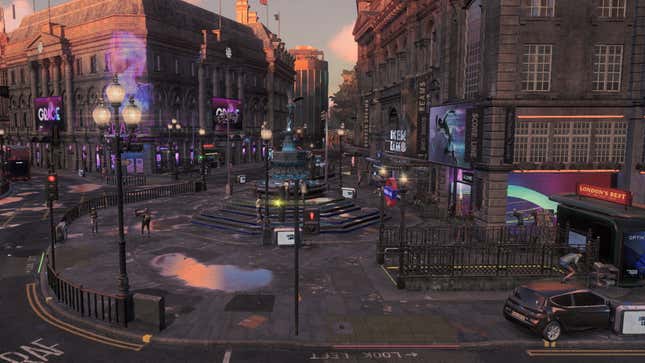
I mentioned that something wasn’t quite right about the look, and honestly, I’m struggling to put my finger on it. The pavements are slightly too squared, the roads too neat, too straight, and the colour is a bit off. But we’re in the uncanny valley here, that place where things are so damned close that tiny details stick out. It’s really an astonishing feat.
It is, of course, as silly to try to ascribe a particular vibe or mood to London as it would be to Washington DC or Mumbai. London is many, many places, from the ludicrous affluence of Knightsbridge, to the brutal poverty of parts of Tower Hamlets. It is a city of multiple cultures, recognised as one of the most diverse cities in the world (in stark contrast with much of the rest of the nation), with over 300 languages spoken in homes across the area. In the last census a decade ago, 39% of London’s eight million citizens were born in other countries, and fewer than half the population are White British. As a result, London offers a vast and rich medley of culture, unlike anywhere else in the country. Also it has a lot of touristy buildings and palaces, and you can likely guess which is front and centre here.
So yes, your first mission, after the game’s woeful opening, takes you to a (very imaginary) pub opposite the Palace of Westminster and Big Ben, because surely nothing is more recognisably London than that. You can even see the London Eye peeking around the corner. At this point you might as well be wearing a pearly suit and eating a bowl of jellied eels, GOR BLIMEY GUVN’R! But, to the game’s credit, the racial diversity is splendid.
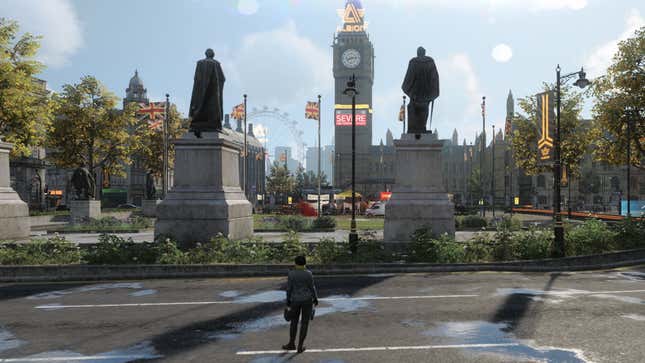
Let’s get that opening out of the way. Eschewing the usual hoodied youngsters of the series, you begin playing the suave and dreary Dalton Wolfe, a Bond-a-like with a gruesomely on-the-nose name. He’s voiced by the locally well known TV actor Warren Brown, and he does a great job! Unfortunately, he does a great job of being exactly what this game shouldn’t have started with, in a really odd misstep.
Legion’s great joy is that you can play as anyone. So I found it disappointing that you start as the most generic, boring, posh white man. Fortunately, spoilers, he gets blown up in about ten minutes, and thank goodness.
Once you’re past it, Legion has a truly magical element of letting you recruit absolutely anyone you see in the streets, and then crafting a mini mission chain to win them over to Dead-Sec. Then, impossibly, that character becomes an integral part of the story, their look and voice appearing in cutscenes, offering dialogue in any situation specific to themselves. Of course this would eventually break down if you pulled at it hard enough, but as you start playing it’s utterly astonishing. I recruited an elderly lady, homeless man and Indian businesswoman, and each stays in their character as they respond to main mission threads. Gosh, the amount of recorded dialogue must be beyond comprehension.
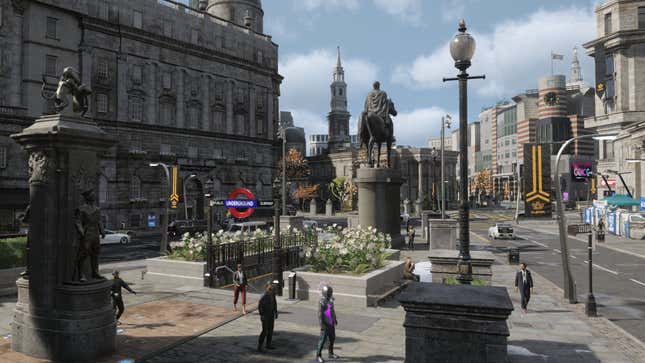
I can’t really not make comment on the creepy similarities between Legion’s dystopian corporate-run London, and the unnerving reality we’re currently living in. Recently I have been properly shaken by strange real-life details that I’ve only ever seen in games before, like warning messages being displayed on the digital read-outs on the sides of buses, and advertising hoardings being taken over by government messages informing me how to behave during this pandemic. Clearly such displays are intended to protect me, but when the UK government is simultaneously taking advantage of this situation to demolish hundreds of years of democratic standards, while merrily breaking its own rules in public, the inevitable parallels are chilling.
Still though, it’s such a rare treat to hear people being called “arseholes” rather than “assholes,” a dilution which has so much less oomph to it. And goodness me, you know you’re in England when you see the word “CUNT” emblazoned across the protest banners. Being told to “Fuck off you fucking twat,” feels very London too.
There’s something rather cheekily thrilling about realising how much of the dialogue is just going to be garbled madness to most of the game’s audience. I cannot wait for international players to not have it explained what it means for something to have “gone Pete Tong.” I mean, it’s not exactly the most opaque of rhyming slangs, but it’s so brilliantly incongruous when said in the middle of a sentence. Finally, a game where it’s my nation’s oddities that alienate!
But goodness me, this is a sweary game. You can’t walk down a road without hearing someone effing and jeffing at another character. It’s like Deadwood: London. And to be fair, this too is stunningly accurate. Where cursing in America seems to be reserved for screaming out of car windows, it’s used in place of punctuation in everyday British discourse.
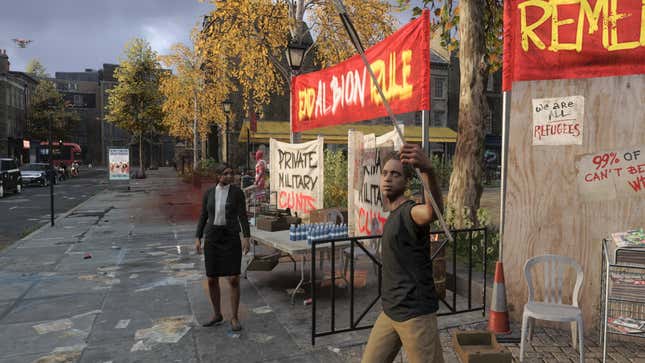
Some of the accents are fantastic, and it’s a joy to hear them in a game. There are a lot of West Indian voices in there, and some melodic Caribbean-to-London tones. Then of courses there’s yer cockneys, some posho-types, and an all-round splendid mixture of voices. On the other hand, there are some absolutely abysmal efforts, often bordering on the offensive. In particular is one main character who is supposed to be Jamaican, but it slips in and out so frequently as to sound like a grim pastiche. Along the way there are many others where I can only hope the voice actor was at least of the nation’s descent, but not very good at the accent. That’s the least offensive option, anyway. Meanwhile I met a guy who sounded as if he were ping-ponging between Northern Ireland and Liverpool, sometimes within the same word.
Also in the mix is Mary Kelly, the head of an evil gang of Laaaaaahndaaahhn geezers, cast and modelled to look like a British soap archetype. To understand British soap operas, you need to think of a US soap opera, and then imagine the exact opposite. Where Days Of Our Lives is about ludicrously beautiful people in pastel sets all sleeping with their secret twins, Britain’s Eastenders is about miserable, ugly people who all hate each other, angrily shouting in a dingy brown pub. Mary would fit right in, her leathery face and arsehole-mouth seeming like it could at any moment utter a “GET AAAHHHT MOI BOOZER!”
The worst acting, tragically, belongs to one Bagley, a so-called AI, who is programmed to talk in chipper colloquialisms and swear incongruously, all voiced by Pascal Langdale sounding like he’s... reading… off… a… page without his... glasses? on. It’s so weird. He was fine in Killjoys! Why is he so astronomically awful in this? It doesn’t help that his script is an incessant torrent of cringe, but he doesn’t do it any favours. And unfortunately, he’s omnipresent, the only voice you can’t get away from.
I suspect I’m far more likely to find bad British acting intrusive and unforgivable than bad American acting. It’s something about familiarity, I would think. I wonder if the reverse is true for American players, more easily frustrated by a bad Southern drawl.

Something I’ve found very interesting in playing a game set in my home land is just how difficult it is to remember to drive on the left. As a driver, in my everyday life this isn’t something with which I struggle. But it appears my brain has completely partitioned real driving and game driving, and when holding a controller I instinctively drive on the right. This has caused some consternation in digital London, although like in most open world driving games, you do spend most of your time weaving randomly all over the road, trying to avoid all the boring computer-controlled drivers who drearily obey fussy details like speed limits and traffic lights.
Of course you don’t have to drive. The London Underground as the game’s on-foot quick travel system is a sensible idea, if we can allow ourselves the fantastical idea that in the dystopian future they might have it so all the lines are working all the time, and half the stations aren’t closed due to escalator failures. But at the same time it certainly doesn’t make sense that you have to unlock any station you’ve not been to before by visiting it overground first. The Underground might offer a map that looks like someone spilled some oddly coloured spaghetti, but it’s not that completely impossible to navigate. And it does seem a very wasted opportunity to not have the locked stations inaccessible due to bomb threats or broken lifts.
Oh, and tangentially talking of bomb threats, there’s one rather uncomfortable thing that’s probably worth noting while we’re talking about how Londony this game is: it’s hard not to foresee the tabloid articles that will follow its release about how the game allows you to recreate recent terrorist attacks. Because, well, the game allows you to recreate recent terrorist attacks. Like 2017’s horrendous incident where three men drove a van down the pavement on London Bridge, mowing down pedestrians, before randomly stabbing people in Borough Market. All of which is is fairly perfunctory to perform in the game. (Well, there are no knives, but plenty of other ways to kill by hand.)
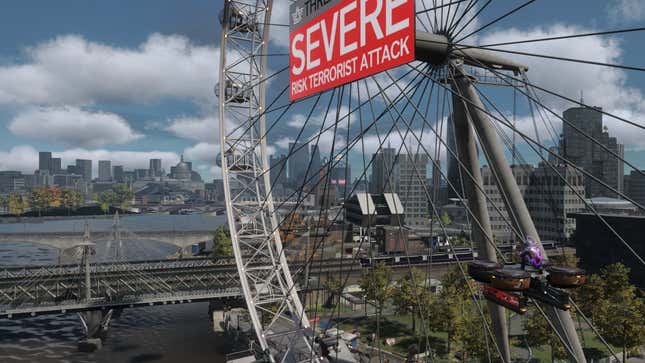
I’m not here to say how good Watch Underscore Dogs Legion is, but it’s silly for me not to comment on just how playable it is. This is Ubisoft doing what they do so well, creating a vast space and then letting you do an enormous amount inside it, occasionally remembering to play the main storyline. And as always, it also feels flaky, with daft AI, and bonkers glitches all over the place. (I like how if you take someone out on a boat, their body remains floating in space a few meters above the river after the boat sails off.) But most of all, as is most familiar in the extraordinary historical locations of the Assassin’s Creed games, this is a phenomenal recreation of London.
Sure, everyone’s going to find faults. There’s this odd habit of having one building be stunningly accurate, and then the next row of them all have the wrong roofs. And if your road is one of those missed out for shrinkage reasons, you’re going to be gutted. But honestly, that’s not really a big deal when you can often navigate your way around the streets of areas you know in real life. At one point I wanted to find my way to Oxford Street, a road on which I used to work over 20 years ago, so I used Google Maps’ directions to get there by road from Piccadilly Circus, and it worked! It’s a shame that when I got there it was completely unrecognisable. The tube station existed right on the edge of the game’s boundaries, and as such they’d fictionalised some dead ends and removed a couple of major routes. But still, come on.
You certainly couldn’t use Legion as a sensible way to learn your way around the city. Oxford Street, mentioned above, turns out to be impossibly close to the BBC’s headquarters, Broadcasting House. (Although here called GBB House.) Plus the distinctive All Souls Church right outside the Beeb is called United Souls Church in Legion. Let’s call it a parallel world London. Earth 2’s London. And yet if you played this, and then visited the city, you’d certainly have a good sense of place, and even in which directions you should head to find the next tourist spot.
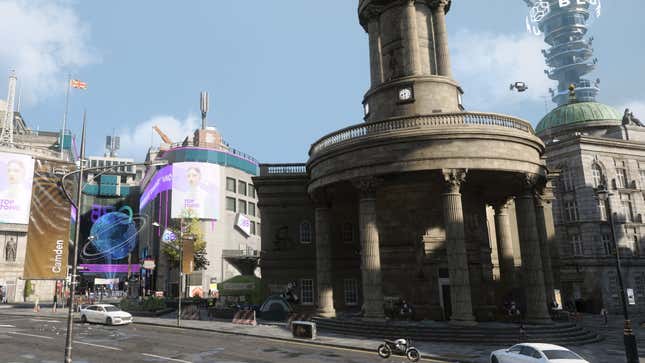
I am, however, completely bewildered by the game’s decision not to tell you which street you’re on either in-game or on the map, and yet have that specific location marked on any snaps you take with the Photo Mode. It’s so, so odd, and makes navigating in-game far harder than it need be. It seems such a wasted opportunity! I’ve ended up taking photos just to find out where I am in London, to then compare it to the real world, which is a very awkward way of doing things.
I’m delighted by the representation of central London’s ethnic diversity, if disappointed by the quality of a lot of the voice acting. And it’s a shame it doesn’t go down as far South as Brixton, or West of Buckingham Palace, but I suppose we should cut them some slack. I mean, they created something of a miracle already. Life-long residents of London might have some more bones to pick than I, living as I do 120 miles away in the South West. But having worked there in the past, and visited on very many occasions, it was a treat to go to places I know well and remember my way around.
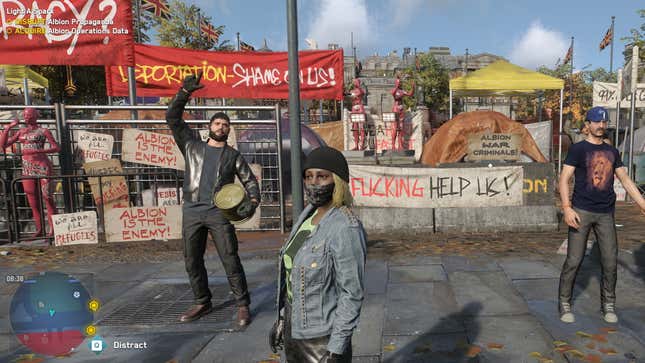
Watch Dogs Legion, as a game, feels like a magic trick I don’t want to study too carefully. The ability to approach absolutely anyone on the streets of London and then have them become a central player in the story of the game, is astonishing. I feel sure that if I look too closely, poke too hard, I’ll see the sleight of hand and the mystery will be ruined. But Watch Dogs Legion as a place is a real masterpiece. This is the Londoniest London gaming’s ever offered.